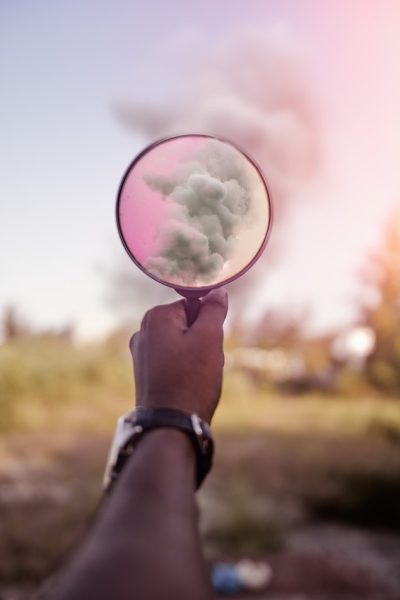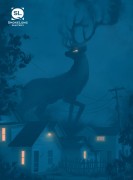This very humorous story shows a person communicating with another species with some advanced technology. Do you have a desire to upload information to a non-human being? Do you think it will ever be possible?
I’m obviously amused and delighted by the fantastical notion of interspecies communication. (I’ve wondered plenty—who doesn’t?—what’s really going on between dogs and their humans, and I’m as much of a sucker for microscopic cuteness as the next person.) But in writing a story like this one, and in writing fiction in general, I’d say my real concern is whatever communication I might manage to achieve with my own species. That’s what seems most difficult to me, and most worthwhile.
It seems like you had to research tardigrades for this story, unless you were already familiar with them. Do you often research for your art? What was the process of writing this story like?
Before I wrote this story, I didn’t know a thing about tardigrades—I came pretty late to the mania about them that apparently thrives in certain regions of the Internet. It was ultimately human fascination with tardigrades that drew me to them, particularly what seemed to drive that interest: a sense that their survival skills predict they will one day be “the last life on Earth.” (Tardigrades were “discovered” in 1773, but I suspect it’s the trifecta of recent research on their resilience, the adorable 3D renderings of this micro-animal that we can produce and circulate in our time, and our mounting sense of planetary doom that has led to their present popularity.)
It was through reading some of the science that I formed my own understanding of their significance to humans, and the story came from there. In writing the story, I also embraced scientific imprecision (beyond the main conceit) where it made sense; my loyalty was not to the science of tardigrades but to the understanding my narrator had of this creature. I learned they are not, for instance, true extremophiles—they don’t adapt to catastrophe, only endure it. The narrator’s mistake when it comes to this distinction is relevant to what the tardigrade has to teach her by the story’s end.
You know, since you’ve asked, I do often research (somewhat casually) as I write, and often that research has to do with science. It used to come as a surprise to me that I turn so often, in my fiction, to science, technology, medicine … as any scientist reading my work is bound to recognize, I have absolutely no training in any of it! But I’ve realized that there is something in science that sparks my literary imagination. Part of this is because science is (currently) the means by which we all understand ourselves and our world, fundamentally (whether we agree with what science has to say, or not). I think that’s why science presents itself to me as a kind of mythology, with its own fascinating—and very human—internal rules and fallibilities. When I read a little snippet of science, it tends to strike me allegorically. I get an itch to play with the established facts of our universe, figure out where they might reveal something to us beyond the bounds of what science has declared to be true, something literature might uniquely have to offer. I think that’s why my narrator goes to the tardigrade on scientific terms, and, thanks to the tardigrade’s take on things, leaves with an answer that is, I hope, quintessentially literary.
We get a glimpse of this narrator’s life with this line: “I can’t withstand the pressure of a match.com date, even though my biological clock is ticking down loudly to generational extinction.” Not only is this funny, but also it gives the reader a glimpse of the narrator’s current stressors. How did you decide how much of the narrator’s personal life to include in the story?
I admit that my choice of these details, and where they belonged in the story, happened instinctively (and unexpectedly, since I’m pretty sure Internet dating was farthest from my mind when I sat down to write). Once I’d written the line, I asked myself what the heck I was doing, and I decided it belonged. I wanted my narrator to be something of an everywoman, and I let the story define for me what “everywoman” meant: She had to struggle with survivalist behavior in her everyday life.
At the end, the narrator says, “That’s why I’d come to the tardigrade. I knew she would have the last word.” Why does the narrator take comfort in the tardigrade’s final gesture? Was the narrator looking for confirmation that the nature of humanity is “nasty business,” as the tardigrade said?
That’s a thoughtful way of putting it—that the narrator was looking for confirmation. I do feel that the narrator wanted the tardigrade to share her low opinion of the state of humanity; maybe she thought the only way she could commiserate about this state was to talk about it with a non-human. And I suppose that by introducing the tardigrade to humanity via Twitter, she’s encouraging the “nasty business” assessment. But the narrator also hopes the tardigrade will offer a solution to the problem, something that will increase the odds that humanity will survive the fallout of its supposed “nastiness.” I think that in the answer she gives the narrator, the tardigrade shifts the terms of the problem (of our supposed nastiness, or profligacy, or impunity) as well as its solution. So the tardigrade does have the last word, specifically because it is not the last word our narrator expected. Scientific inquiry can sometimes yield unexpected results, not just confirmations, but I guess I’m revealing my own bias here in suggesting that fiction always uncovers the unexpected. It definitely does for me as I write it. I usually come in pretty confident about where I’m headed and then get knocked on my ass. I figure that if I don’t, I’m probably doing it wrong.



 The core workshop of SmokeLong Fitness is all in writing, so you can take part from anywhere at anytime. We are excited about creating a supportive, consistent and structured environment for flash writers to work on their craft in a community. We are thrilled and proud to say that our workshop participants have won, placed, or been listed in every major flash competition. Community works.
The core workshop of SmokeLong Fitness is all in writing, so you can take part from anywhere at anytime. We are excited about creating a supportive, consistent and structured environment for flash writers to work on their craft in a community. We are thrilled and proud to say that our workshop participants have won, placed, or been listed in every major flash competition. Community works.